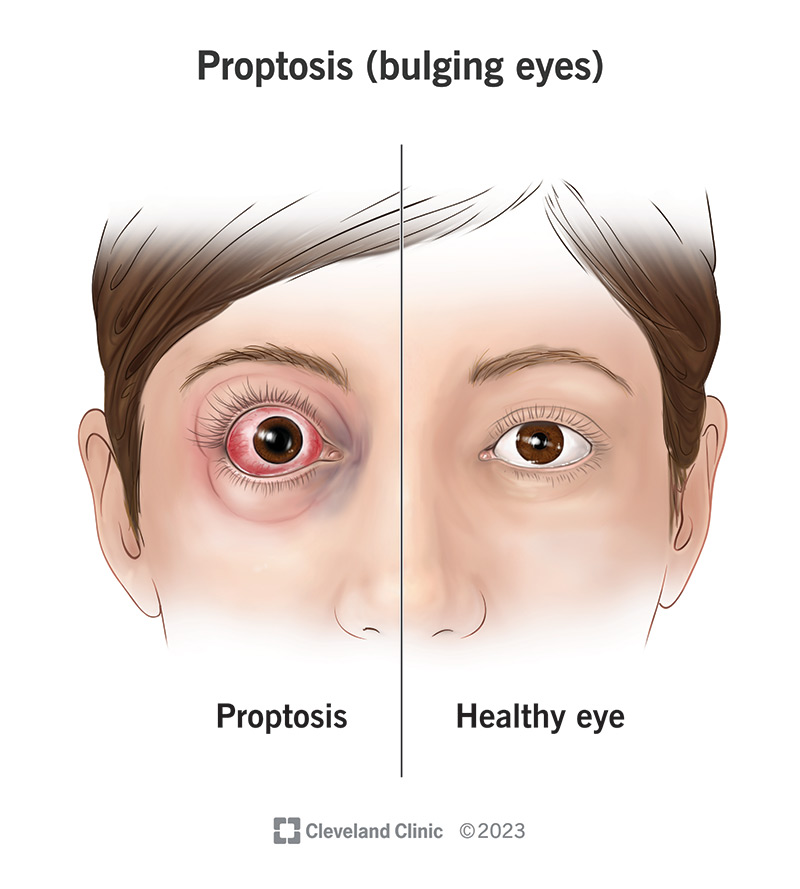Bulging eyes, also called exophthalmos or proptosis, is when one or both of your eyes protrude from their natural position. Thyroid issues, such as Graves’ disease or hyperthyroidism, are the most common causes of the condition. Treatments include medications for thyroid disease, artificial tears, corticosteroids, immunosuppressants and surgery.
Advertisement
Cleveland Clinic is a non-profit academic medical center. Advertising on our site helps support our mission. We do not endorse non-Cleveland Clinic products or services. Policy

Image content: This image is available to view online.
View image online (https://my.clevelandclinic.org/-/scassets/images/org/health/articles/proptosis-bulging-eyes)
Proptosis is when one or both of your eyes bulge from their natural position. The condition can affect your appearance, leaving you with a startled expression that doesn’t go away.
Advertisement
Cleveland Clinic is a non-profit academic medical center. Advertising on our site helps support our mission. We do not endorse non-Cleveland Clinic products or services. Policy
Proptosis can also make it difficult for you to blink. When you can’t blink, the protective outer layer of your eyes (corneas) doesn’t receive the lubrication it needs to do its job. You may be at risk for cornea damage. Some people experience other complications, like low vision or double vision (diplopia).
Other names for proptosis include bulging eyes, protruding eyes and exophthalmos.
When your eyes bulge, the white part of your eyes is more visible. In addition, your eyeballs push forward from your eye sockets. You may be able to see less of your upper eyelids because your eyes look like they’re wide open.
Other symptoms of a bulging eye that you may experience include:
Symptoms of proptosis that need a prompt evaluation from a healthcare provider include:
The most common cause of bulging eyes is an autoimmune disease in which your body’s immune system attacks cells in your thyroid gland and the tissue behind your eye. Proptosis in people with thyroid issues is also called thyroid eye disease (TED). People who have thyroid issues are the most likely to experience bulging eyes. Proptosis causes include:
Advertisement
Most people don’t experience complications or long-term effects. In rare cases, double vision or vision loss may be permanent. It’s also possible to experience cornea damage if you can’t blink and lubricating eye drops aren’t effective.
Your healthcare provider will ask about your symptoms and medical history to determine the potential causes of your bulging eyes.
They’ll also perform an eye exam that may include:
Your healthcare provider may perform or recommend other tests, including:
Your treatment may include:
Other therapies may include:
You may need surgery to:
You’re more likely to have good outcomes if you receive timely treatment to address the cause of your symptoms. Getting the right therapies for your needs can also help you avoid complications.
Yes. But even with successful treatment, it may take a while for your eye to return to its usual position. In some cases, it takes years.
Advertisement
Steps you can take to prevent proptosis from getting worse include:
Protruding eyes can change your appearance and cause issues with your confidence and self-esteem. If it affects your vision, you may experience unexpected changes in your daily life. These changes can leave you feeling upset, anxious or depressed.
Support from a mental health professional or social worker can help you feel better:
If you have bulging eyes, you may be feeling a whirlwind of emotions. Don’t let proptosis disrupt your life. The sooner you see your healthcare provider, the sooner they’ll be able to determine the cause. That will help guide your treatment and prevent complications. It’s also important to take care of your mental health. Reaching out to a mental health provider can help keep your emotions in check, and a social worker can help guide you to resources you can use for support.
Advertisement

Sign up for our Health Essentials emails for expert guidance on nutrition, fitness, sleep, skin care and more.
Learn more about the Health Library and our editorial process.
Cleveland Clinic’s health articles are based on evidence-backed information and review by medical professionals to ensure accuracy, reliability and up-to-date clinical standards.
Cleveland Clinic’s health articles are based on evidence-backed information and review by medical professionals to ensure accuracy, reliability and up-to-date clinical standards.
Cleveland Clinic’s ophthalmologists and optometrists have the highest training available. We provide exams, vision correction and care for many eye conditions.
